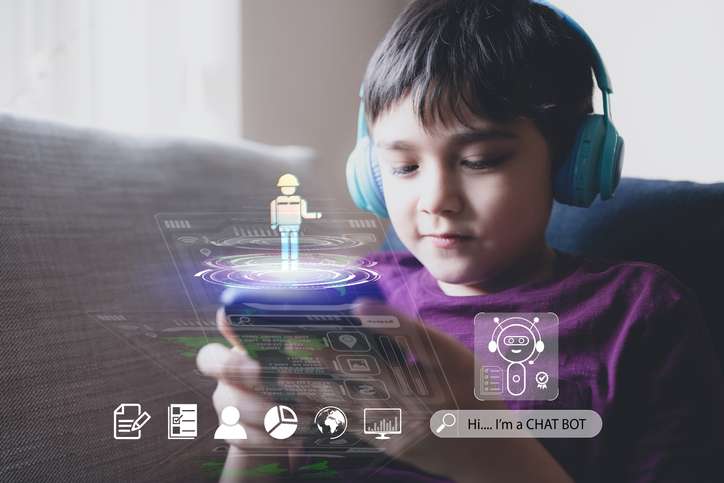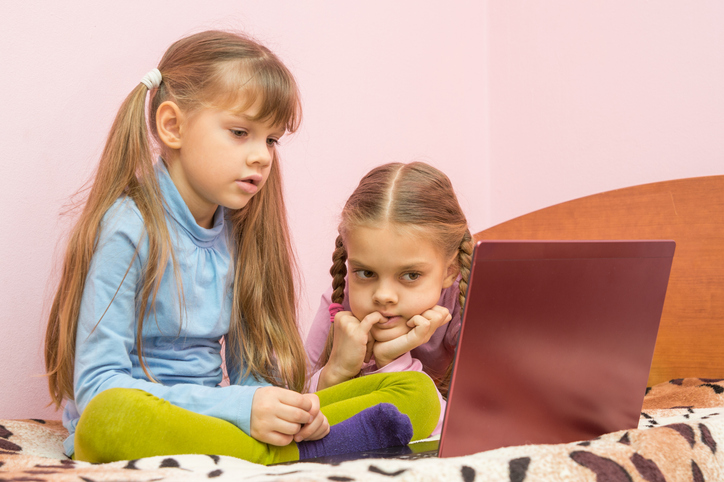Is ChatGPT Safe for Kids? Potential Dangers of AI for Kids

AI and algorithms have been a big part of our daily lives for a while now, but the advancement of technology has seemingly been moving more quickly in recent months.
Following the story about Microsoft’s Bing Chat bot, systems like ChatGPT from OpenAI have recently been among the biggest subjects in technology news, and continue to trend on TikTok as people share interactions and creations they made using the software.
Ethical concerns about AI have been around for years. What does it mean for the future of society if technology can mimic human-like responses? Will it eliminate all of our jobs?
These concerns are especially important for the younger generations. Kids today, and kids not even born yet will be most affected by the ongoing AI revolution.
Related: Are Your Kids Cheating with ChatGPT: What Parents Need to Know
So how do you talk to kids about the safety of AI tools like ChatGPT and keep them protected from things like deep fakes and other misleading information online?
Is ChatGPT Appropriate for Kids?
The minimum age to use ChatGPT is 13 years old, so it is really not appropriate for younger children. According toChatGPT's terms of use, anyone using ChatGPT between the ages of 13 and 18 needs parental or guardian permission.
There are AI chatbots designed for children that may be a better fit. But kids have started using the program and will be more likely to be exposed to it as time goes on.
AI tools are only going to become more common in the workplace and schools, so it’s important to have an open and non-judgmental conversation with children about what artificial intelligence software like this means for the future and how to use it now.
With this generation growing up surrounded by technology, despite our best efforts, they will likely be exposed to AI chatbots whether or not we want them to.
Working through transformer architecture, ChatGPT is a multi-functional AI chatbot. Trained through an algorithm, this system can do a variety of tasks based on the information fed to it.
From carrying on a conversation to teaching language skills, learning a new language, or building a website, the options with the chatbot from OpenAI are virtually endless. Natural language processors can “carry on conversations,” because they have been programmed to use words like a human would.
As of February 2023, ChatGPT set a record for the fastest-growing user base. With its large language model, the chatbot is being used for computer programming as well as social media posting and has even started creating video games, making the work a person would do in less than a minute.
Is ChatGPT Safe for Kids?
ChatGPT was never intended for children. OpenAI says the application is appropriate for people 18 and older. But that does not mean kids are not using it, or that they will not be exposed to it at school or when hanging out with friends.
Dangers of ChatGPT for Kids
Inappropriate Responses and Sexual or Violent Content
The GPT-4 language model has blown up in popularity since its public release on March 14, 2023. Since then, the software has been used for everything from programming new video games to writing emails and carrying on conversations using the system’s AI language model. With such an open world of information, it’s likely children will come across inappropriate material with ChatGPT.
The bot’s responses are all generated by user input and are not filtered, so a search could show mature or violent content that parents would not want their children to see or learn about.

AI Plagiarism and Cheating on Schoolwork
A study showed the bot will willingly plagiarize or write material with misinformation or bias, so it’s important your kid is old enough to understand the ramifications of false information as well as not to use it to do their homework.
Kids who rely on chatbots for answers are cheating. In addition to not learning, they may not understand the ramifications of plagiarism, which is why it is important for parents to discuss the consequences kids can face for lying or cheating on assignments.
Stolen Data and Lack of Data Privacy for Kids
Another online safety concern that also applies to ChatGPT is privacy. While conversations and information put into the program are said to be secure and encrypted, the application opens up more risk for phishing and identity theft. Italy has become the first Western country to ban ChatGPT due to privacy concerns.
Like anything on the internet, ChatGPT is not completely safe to use. It protects information using dataset encryption, so text data is made private. But unlike other websites, the conversational, human-like features of this application may make it easier for people — especially children — to be tricked into clicking links or giving away information.
ChatGPT can be manipulated by hackers to steal a user’s personal data or for attackers to target your computer. This application is able to make more convincing spam bots and emails that may look like real companies as well.
Related: The Problems and Dangers of Posting Kids on Social Media
Benefits of AI Chatbots for Kids
Access to Education and Learning New Skills
If used under adult supervision, ChatGPT may answer questions to help children learn. It’s just important that kids know to take ChatGPT’s responses with a grain of salt, as they are built on an algorithm based on the system’s language, and can lead to inaccuracy and the spread of misinformation. Children interested in programming could get hands-on coding experience through the app.
Help with Socialization and Self-Expression
AI platforms are also often used for fun and for people to have “conversations” with the robot at the other end, ask them for advice, or even share their problems. Some AI tools can provide socialization for isolated children. Children with autism who have difficulty with social skills can use AI as a tool to help develop language skills through online conversations.
Related: 20 Best Apps for Kids with Autism to Boost Conversation Skills
Similar to journaling, talking through problems with a chatbot may be a helpful way for kids to share their problems and feelings without worrying about being judged. However, it’s important for parents and children to remember, however, that it should never be considered a replacement for interactions with other people.
Ethical Issues of AI and Machine Learning
Ethical issues arise and can worsen with the use of AI chatbots like ChatGPT. From losing out on important personal development skills to spreading misinformation from plagiarism and claiming credit for others' work, kids should understand the problems that relying on AI can cause
Spreading Misinformation without a Trusted Souce
A spread of misinformation can be taken to the next model as people do research or ask questions to the bots. Kids can get in trouble for cheating on assignments, but they can also be learning false information about a variety of things, from history to how to operate the software.
Many AI tools have been found to relay incorrect information and fake news stories, and kids don’t understand how to tell true from false. It’s important to teach kids about trustworthy academic services and remind them to not immediately believe everything an AI bot tells them.
Loss of Creativity and Self Expression
Using AI to create art, write papers, or teach them to solve a problem can also harm kids’ natural development and hurt their creativity. AI can now instantly generate new artwork, video games, scripts, and novels that many kids enjoy creating themselves as a means of self-expression.
Best kid-friendly chatbot alternatives
There are many child-friendly chatbots and kid-friendly alternatives to ChatGTP that are more appropriate for young children.
Octa
Hailing itself as “the friendly chatbot for kid travelers,” Octa is an AI chatbot designed to help families and their children plan road trips, getaways, and local adventures.
Socratic by Google
For children seeking homework help, a good alternative is Socratic by Google. This free education AI chatbot helps with homework and can answer questions to help children study. Unlike ChatGPT, however, the worry over plagiarizing is minimized, since this app will not write a paper or do your child’s homework for them.
Oyoty
If you want to make sure your kids are safe when using the internet, consider Oyoty. This personal subscription safety assistant helps your child navigate the internet while protecting them from potential cyber danger.
While these options are designed for children, it’s always smart for parents to do their own research and know the risks before letting their kids use them.
Snapchat My AI
For kids 13 and older, My AI was designed as a chatbot “sidekick” for Snapchat users. It also works with Snapchat’s Family Center, to give parents a bigger picture of who their children are interacting with and what they are doing on the application, which Snapchat stresses is meant for interacting only with close friends.
Don’t Ban AI from Kids Entirely
It’s still too early to know the total impact of the coming AI revolution. All things considered, however, staying away from screens and AI completely could set kids behind. They do not need to start too early, but a total ban on technology may lead to kids being behind in a digital world. Kids will be exposed to it either way.
Rather than avoiding it out of fear, having them learn about it at home and keeping communication open about the software will also help them feel comfortable if they have concerns. Be honest with your children about what we do and don’t know about the future impact of AI.
Don’t shun it entirely because your kids won’t. It’s better to learn about the different capabilities together while learning about AI as a family could reduce the risk of danger and misuse of the software as it evolves.
The Time for Kids to Understand the Implications of AI is Right Now
While it may seem like a way for kids to learn and connect. Kids may start to rely on the software instead of studying and learning for themselves. AI like ChatGPT cannot completely replace human interaction, due to a lack of empathy as well as the lack of problem-solving and critical thinking ability that would help weed out inaccurate information.
Deciding whether children should use AI applications like ChatGPT from OpenAI is a personal decision, but many factors should be considered. With some parental control settings, ChatGPT can be safe for kids and even helpful.
Like all new technology, there is a lot of worry and stigma, but as AI is increasingly becoming part of everyday life, parents who talk about it with their children rather than ignore it may have more success in how their family uses it.
Like anything your child does on the internet, it’s important to consider principles of online safety. For more tips on keeping kids safe online check out our 4 Social Media Safety Tips for Kids Parents Need to Know.

